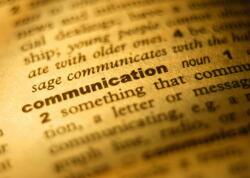The Difference Between Me, Myself and I
 There are a couple of ways to go when you get an email from a malpractice claims counsel that opens chillingly: “This concerns a matter of extreme urgency that is causing me great distress.”
There are a couple of ways to go when you get an email from a malpractice claims counsel that opens chillingly: “This concerns a matter of extreme urgency that is causing me great distress.”
One, you can stop reading, delete the message, and pretend you never got it.
Two, you can keep reading.
I chose the second option. Partly I did so because I knew the sender. In fact he is a good friend.
But mostly I kept reading because I am no longer in active practice, which means my days of causing anyone other than my spouse “great distress” are largely behind me. I figured whatever was bugging my buddy had nothing to do with me.
Myself Is Reflexive, Like Looking In a Mirror
Turns out I was right. My friend was in high dudgeon over the misuse of the word “myself.”
“Please write a blogpost about this,” he implored. “I can’t tell you how many times I’ve gotten a letter from a lawyer that contains a phrase like, ‘the document was signed by my partner, my client and myself.’ Argh! That drives me nuts.”
“Misusing ‘myself’ exposes the writer as sloppy, careless or illiterate,” my friend went on. “What’s so difficult about using the correct word - ‘me?’”
The short answer: “me” scares people. It seems too simple to be correct. It’s too unassuming and informal. Plus it sounds far less learned than “myself.”
Keeping Myself in My Proper Place
Here, then, is a quick summary of how to keep me, myself and I straight.
- “I” is a first person singular pronoun that is used as the subject of a sentence or clause. (Example: I write the songs.)
- “Me” is used as an object. (Ex: The songs are written by me.)
- “Myself” is a reflexive pronoun used when you are the object of your own action – i.e., when “you” are doing something to “you.” (Ex: I could write the songs myself, but they sound better when they are written by Barry Manilow and me.) Other reflexive pronouns are herself, himself, yourself, itself and themselves.
Confusion creeps in because although “me” is an object pronoun (Ex: Barry Manilow hates me), “myself” usually occupies an object position as well. (Ex: I hate myself when Barry Manilow doesn’t like my songs.)
Notice, though, that in the first example, the subject (Barry Manilow) and object (me) are different. Thus, the object pronoun is correct. In the second example, the subject (I) and object (myself) are the same.
“Think about looking in a mirror and seeing your reflection,” writes the Grammar Girl. “You’d say, ‘I see myself in the mirror.’ You see your reflection. ‘Myself’ is a reflexive pronoun.”
You can also use reflexive pronouns like “myself” to add emphasis to a sentence. Used this way, they are sometimes called emphatic or intensive pronouns. (Ex: I myself heard the gunshots. I wrote the brief all by myself.)
Other Grammatical Pet Peeves
Here are some other maddening mainstream malaprops:
- Using “okay,” “um,” and “you know” as filler words. (Ex: Okay, I want to, um, make an objection. You know?)
- Using “go” is a synonym for “say.” (Ex: Then I go, Objection!)
- Using “amazing” instead of “excellent.” (Ex: Your objection was amazing.)
- Starting all sentences with “So.” (Ex: So there I was in court making this amazing objection.)
- Using “like” for no good reason. (Ex: I was, like, making an objection.)
What are some common word uses – or misuses – that get your goat? Perhaps tired clichés like “get your goat?”
No worries. With patience, proofreading and a copy of Strunk and White’s “Elements of Style,” you can keep your language fresh, lively and accurate. You will also make your malpractice defense counsel happy.
Jay Reeves a/k/a The Risk Man is an attorney licensed in North Carolina and South Carolina. Formerly he was Legal Editor at Lawyers Weekly and Risk Manager at Lawyers Mutual. Contact jay.reeves@ymail.com.
Sources:
- Attorney at Work, author Theda Snyder http://www.attorneyatwork.com/cure-bad-speech-habits/
- The Grammar Girl http://www.quickanddirtytips.com/education/grammar/myself
- Grammar Monster http://www.grammar-monster.com/lessons/me_myself.htm
- Dr. Grammar http://www.drgrammar.org/frequently-asked-questions#34




